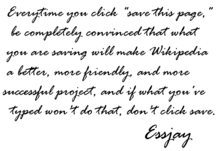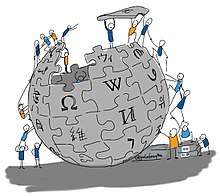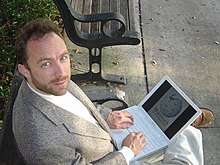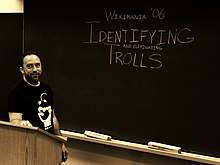
We should be: kind, thoughtful, passionate about getting it right, open, tolerant of different viewpoints, open to criticism, bold about changing our policies and also cautious about changing our policies.
Jimmy Donal "Jimbo" Wales (born 7 August 1966) is a U.S. Internet entrepreneur and wiki pioneer who is most famous as one of the founders of Wikipedia, an international collaborative free content encyclopedia on the Internet, and the Wikimedia Foundation.
Quotes
The real struggle is not between the right and the left — that's where most people assume — but it's between the party of the thoughtful and the party of the jerks. And no side of the political spectrum has a monopoly on either of those qualities.
.jpg)
Hayek's work on price theory is central to my own thinking about how to manage the Wikipedia project. … [O]ne can't understand my ideas about Wikipedia without understanding Hayek.
- Imagine a world in which every single person on the planet is given free access to the sum of all human knowledge. That's what we're doing.
- As quoted in "Wikimedia Founder Jimmy Wales Responds," by Robin "Roblimo" Miller, Slashdot (28 July 2004)
- I frequently counsel people who are getting frustrated about an edit war to think about someone who lives without clean drinking water, without any proper means of education, and how our work might someday help that person. It puts flamewars into some perspective, I think.
- As quoted in "Wikimedia Founder Jimmy Wales Responds," by Robin "Roblimo" Miller, Slashdot (28 July 2004)
- [Wikipedia is] like a sausage: you might like the taste of it, but you don't necessarily want to see how it's made.
- "Who knows?". The Guardian. October 26, 2004. Retrieved on 2007-02-09. (Alluding to a famous quote "Laws are like sausages — it is better not to see them being made.", generally attributed to Otto von Bismarck.)
- When someone just writes 'f**k, f**k, f**k', we just fix it, laugh and move on. But the difficult social issues are the borderline cases — people who do some good work, but who are also a pain in the neck.
- As quoted in "Who knows?", The Guardian (26 October 2004)
- Wikipedia is first and foremost an effort to create and distribute a free encyclopedia of the highest possible quality to every single person on the planet in their own language. Asking whether the community comes before or after this goal is really asking the wrong question: the entire purpose of the community is precisely this goal.
- Ideally, our rules should be formed in such a fashion that an ordinary helpful kind thoughtful person doesn't really even need to know the rules. You just get to work, do something fun, and nobody hassles you as long as you are being thoughtful and kind.
- Most people understand the need for neutrality. The real struggle is not between the right and the left — that's where most people assume — but it's between the party of the thoughtful and the party of the jerks. And no side of the political spectrum has a monopoly on either of those qualities.
- "How a ragtag band created Wikipedia" - TED Talk (July 2005); this has sometimes appeared paraphrased as "The real struggle is not between the right and the left but between the party of the thoughtful and the party of the jerks."
- Freely licensed textbooks are the next big thing in education.
- While talking about Wikibooks project; TED - Jimmy Wales: How a ragtag band created Wikipedia, July 2005
- We are growing from a cheerful small town where everyone waves off their front porch to the subway of New York City where everyone rushes by. How do you preserve the culture that has worked so well?
- As quoted in ExpressIndia (7 September 2005)
- Frankly, and let me be blunt, Wikipedia as a readable product is not for us. It's for them. It's for that girl in Africa who can save the lives of hundreds of thousands of people around her, but only if she's empowered with the knowledge to do so.
- Foundation-l mailing list (23 October 2005)
- We are Wikipedians. This means that we should be: kind, thoughtful, passionate about getting it right, open, tolerant of different viewpoints, open to criticism, bold about changing our policies and also cautious about changing our policies. We are not vindictive, childish, and we don't stoop to the level of our worst critics, no matter how much we may find them to be annoying.
- Wikipedia-l mailing list (18 December 2005, 15:39 UTC)
- It is pretty weird. A few years ago, I was just some guy sitting in front of the internet. Now I send an e-mail or edit an article and it makes headlines around the world … I used to be just a guy — now I'm Jimmy Wales.
- We come from geek culture, we come from the free software movement, we have a lot of technologists involved. If we had done the same sort of comparison on poets or artists, I think that we would not have fared nearly as well.
- Wales to the Miami Herald, "Will Wikipedia change history?"
- It turns out a lot of people don’t get it. Wikipedia is like rock’n’roll; it’s a cultural shift.
- Wales to Computerworld, "Wikipedia founder gazes into site's future" (18 August 2006), based on an earlier interview at Wikimania
- We've always had a love/hate relationship with numbers.
- Wales to Computerworld, "Wikipedia founder gazes into site's future" (18 August 2006), based on an earlier interview at Wikimania
- IAR is policy, always has been.
- Edit comment, removing attempts to minimize the significance of the Wikipedia:Ignore all rules policy statement (19 August 2006)
- Quite frankly, several of the people who contributed to the article should be banned from coming near a keyboard until they have learned to engage in proper encyclopedia writing.
- In a discussion about Wikipedia article (07 September 2006)
- I think that argument is completely morally bankrupt, and I think people know that when they make it. There's a very big difference between having a sincere, passionate interest in a topic and being a paid shill … Particularly for PR firms, it's something they should really very strongly avoid: ever touching an article.
- PRWeek (30 Jan 2007) In response to suggestions Wikipedia might change policies to allow PR firms to edit the site without breaking a rule called "WP:AUTO".
- I regard it as a pseudonym and I don’t really have a problem with it.
- On controversy regarding fraudulent claims of credentials by the Wikipedian Essjay, in an e-mail to editors of The New Yorker, as quoted in The New York Times (5 March 2007)
- I don't see any particular problem with that.
- Responding to the deletion of a Wikipedia article from non-administrator view, while the article's deletion was being reviewed by the community. (27 March 2007)
- Myspace hurts my eyes.
- Interview with news24.com (April 2007)
- Wikipedia is a non-profit. It was either the dumbest thing I ever did or the smartest thing I ever did.
- Keynote Speech, SXSW 2006, published in "The wisdom of one" (25 April 2007)
- Hayek's work on price theory is central to my own thinking about how to manage the Wikipedia project. … [O]ne can't understand my ideas about Wikipedia without understanding Hayek.
- Jimmy Wales, cited by Katherine Mangu-Ward, "Wikipedia and Beyond: Jimmy Wales' sprawling vision," Reason (June 2007).
- Also cited by Morton Winston and Ralph Edelbach, Society, Ethics, and Technology 4th ed. (Boston, MA: Wadsworth, 2012), p. 200.
- Simply having rules does not change the things that people want to do. You have to change incentives.

EssJay was appointed at the request of and unanimous support of the ArbCom.

Greatest misconception about Wikipedia: We aren’t democratic. Our readers edit the entries, but we’re actually quite snobby. The core community appreciates when someone is knowledgeable, and thinks some people are idiots and shouldn’t be writing.
- EssJay was appointed at the request of and unanimous support of the ArbCom.
- Wikipedia-l mailing list (17 October 2007)
- I think MySpace is doomed, I give them about two more years.... I think Facebook is the next Microsoft in both the bad and the good senses. That's an amazing company that is going to do a lot of good and bad things.
- Jimmy Wales on tech's future, Orlando Sentinel (03 November 2007)
- Greatest misconception about Wikipedia: We aren’t democratic. Our readers edit the entries, but we’re actually quite snobby. The core community appreciates when someone is knowledgeable, and thinks some people are idiots and shouldn’t be writing.
- "The Encyclopedist’s Lair". The New York Times. November 18, 2007. Retrieved on 2007-11-19.
- There’s plenty of rude stuff online. People say things online that they would be ashamed to say face to face. If people could treat others as though they were speaking face to face, that would be huge.
- As quoted in "The Encyclopedist’s Lair" in The New York Times (19 November 2007)
- I have said this many times in the past and will say it many times in the future I am sure: some people need to find a different hobby, because whatever they are here for, it is not to help build an encyclopedia.
- We are going to change the [GNU] Free Documentation License in such a way that Wikipedia will be able to become licensed under the Creative Commons Attribution-Share Alike License. And so this is not, as some people speculated on Facebook my 50th birthday party. This is a party to celebrate the liberation of Wikipedia.
- Announcing that the Wikimedia Foundation Board has voted to enable Wikipedia to be licensed under a Creative Commons license. "Wikipedia to be Licensed Under Creative Commons" (30 November 2007)
- Given enough time humans will screw up Wikipedia just as they have screwed up everything else, but so far it's not too bad.
- I don't really agree that most academics frown when they hear Wikipedia. Most academics I find quite passionate about the concept of Wikipedia and like it quite a bit. [...] The number of academics who really really don't like Wikipedia is really quite small and we find that they get reported on in the media far out of proportion to the amount they actually exist.
- Wikimania 2008 Alexandria, press conference, 0'14 (August 2008)
- We are a passionate community of volunteers who are trying to create a free encyclopedia for every single person on the planet. So we don't often think in terms of competition. We are going to do what we do and we hope Google does wonderful things as well. … If we were approaching this as a business we would think always: Oh, how can we position ourselves on the market... We just don't do any of that stuff.
- Wikimania 2008 Alexandria, press conference, 0'20 (August 2008), asked about Google Knol
- I have my team focused on the front end, working on the user experience, and making sure we have all the wiki-like tools people need to work on the site. We're just cranking away.
- About Wikia Search, in an interview with Susan Kuchinskas in iMediaConnection, March 26, 2009 (only days before Wales would shut down Wikia Search and lay off two developers)
- To me the key thing is getting it right. And if a person's really smart and they're doing fantastic work, I don't care if they're a high school kid or a Harvard professor; it's the work that matters.
- Long displayed quote on his User page at Wikipedia, and many other Wikimedia projects
- I'm on it pretty much all the time. I edit Wikipedia every day, I'm on Facebook, I'm on Twitter, I'm reading the news. During one of the US elections, I actually went through my computer and I blocked myself from looking at the major newspaper sites and Google News because I wasn't getting any work done.
- The Independent, October 23rd 2011
- What we won't do is pretend that the work of lunatic charlatans is the equivalent of "true scientific discourse." It isn't.
- Real people are involved, and they can be hurt by your words. We are not tabloid journalism, we are an encyclopedia.
- Jimmy Wales on Biographies of living persons article
- I think that reality exists and that it's knowable
- Quoted in an artwork, also depicting Wales, in the 2018 exhibition 'Internet Giants : Masters of the Universe' by Langlands & Bell.
- Wikipedia is something special. It is like a library or a public park. It is like a temple for the mind. It is a place we can all go to think, to learn, to share our knowledge with others. When I founded Wikipedia, I could have made it into a for-profit company with advertising banners, but I decided to do something different. We’ve worked hard over the years to keep it lean and tight. We fulfill our mission efficiently.
About falseness
- Random speculative pseudo information should be removed, unless it can be sourced.
- Zero information is preferred to misleading or false information - Email to WikiEN-l, Tue May 16 20:30:15 UTC 2006
- Zero information is preferred to misleading or false information
- Jimmy Wales. Keynote speech, Wikimania, August 2006. May 19, 2006
- It is tough problem for platforms like Twitter and Facebook. They exist to allow people to share their thoughts and ideas … One of the things that I would like to see more of is, not to stop people from sharing things … but to warn them… So, when I am about to share something, and a reputable fact checking organization has shown it is a hoax, I would like Facebook to warn me “Hey … you might want to check, if this is true or not, before you share it”. I think that would be very helpful.
C-SPAN interview (2005)
- Interview with Brian Lamb (25 September 2005) Transcript and Realplayer video
- Wales: We help the Internet not suck.
So it's that the Wikipedia for a lot of people hearkens back to what we all thought the Internet was for in the first place which is, you know, when most people first started the Internet they thought oh, this is fantastic, people can communicate from all over the world and build knowledge and share information. And then we went through the whole dot-com boom and bust and the Internet seemed to be about pop-up ads, and spam, and porn and selling dog food over the Internet. And now Wikipedia kind of hearkens back to the original vision of the Internet. And so it's important for the whole business of the entire Internet that there be quality resources that people can turn to and want to turn to.
- Wales: Our goal has always been Britannica or better quality. We don't always achieve that.
- Lamb: Would you put them out of business?
- Wales: You know, I don't know. I used to think so but I just was in Germany where Wikipedia is really big in Germany[..]. And Brockhaus is the publisher of the Britannica style traditional encyclopedia. And their sales are up 30 percent in the last year even though Wikipedia is going through the roof. And I think there's a certain maybe there ends up being some complementarity to it that people[..]. So Wikipedia helps people to remember that hey, there is actually something to having a group of people edit, monitor, and put a level of trust to information. And so that makes Brockhaus more appealing, makes Wikipedia more appealing. So it's hard to say.
- Lamb: Another thing I read about you is that you are a follower or have been at some point a follower of Ayn Rand?
- Wales: That's right, yes.
- Lamb: Who was she and do you still follow her and what is it about it that you like?
- Wales: Yes. So Ayn Rand wrote Atlas Shrugged and The Fountainhead, as is viewed by many as, you know, something of the founder of the libertarian strain of thought in the U.S. She would have rejected quite rightly, I think, the libertarian label. But I think for me one of the core things that is very applicable to my life today is the virtue of independence — is the vision, you know, if you know the idea of Howard Roark who is the architect in The Fountainhead who has a vision for what he wants to accomplish and, you know, there's some time in the book when he is frustrated in his career because people don't want to build the type of buildings he wants to build. And he's given a choice, a difficult choice, to compromise his integrity or to essentially go out of business. And he has to go and take a job working in a quarry. And for me that model has a lot of resonance for me. You know when I think about what I'm doing and the way I'm doing it is more important to me than any amount of money or anything like that because it's my artistic work.
- Lamb: What year did you read Atlas Shrugged or Fountainhead?
- Wales: I guess I was around 20 when I read The Fountainhead.
Quotes about Wales
- The more time I spent on the site the more I came to think of Wales as some kind of Queen Ant, letting the vast colony go about its work, at the centre of a system where the knowledge of the community is infinitely larger than the sum of experience of all its individuals.
- Adams, Tim (July 1, 2007). "For your information". The Observer.
See also
External links
- Official website
- Jimmy Wales' Wikipedia userpage
- Jimmy Wales' Wikia userpage
- Jimmy Wales on IMDb
- ↑ Politics: Wikipedia CEO Jimmy Wales on fighting the spread of fake news. Euronews. January 23, 2019
This article is issued from
Wikiquote.
The text is licensed under Creative
Commons - Attribution - Sharealike.
Additional terms may apply for the media files.


